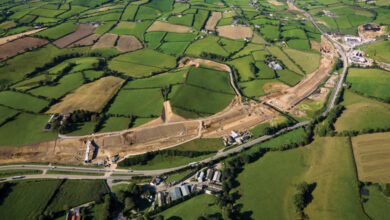Councils planning ahead
In April the majority of planning functions from the Department of the Environment (DOE) transferred to the 11 new councils. agendaNi outlines this enhanced planning role.
Planning applications are now categorised within a new hierarchy of development as either local, major or regionally significant. The DoE has retained responsibility for the determination of regionally significant applications, as well as wider regional planning policy, planning legislation, performance management and oversight and guidance functions for local councils. Local government has now assumed responsibility for determining all local and major applications. Applications which will come before the planning committees are likely to include large developments, contentious applications and those which are subject to objections.
Each council has now introduced a planning committee to consider relevant applications, however not all applications will come before the
planning committees. Instead, the councils will publish a Scheme of Delegation which will outline which applications will be delegated to officers rather than the committee.
Local planning offices established within each council area are staffed by experienced planners and will provide advice for the majority of planning applications or queries about the process. Indeed a group of staff have been moved from existing DoE local planning offices into council offices and will continue to carry out their normal planning tasks alongside new council colleagues. The three main planning powers which have been transferred to the councils are:
• the development of a local plan which outlines how the area should look;
• final decision making on the majority of planning applications; and
• investigating suspected breaches of planning legislation and implementing appropriate enforcement action.
The councils, in consultation with the local community, are therefore responsible for the creation of a Development Plan for each of the 11 regions. The plans are a significant factor in the process of considering planning applications and decision making. They are intended to ensure that an adequate area of land is available for the housing, employment and facility needs of the local population, without forgoing significant landscape and environmental features. These development plans can be utilised to identify the best locations for new homes, businesses and infrastructure while also protecting valuable regions for both people and wildlife.
The new process for preparing development plans was designed and introduced in an effort to speed up plan making, enhance public participation and facilitate a process that is adaptable to change and capable of swifter review. Councils are therefore required to regularly monitor and review their development plans in order to ensure that these remain as flexible and responsive to change as possible. Councils must produce an annual monitoring report, review implementation of the plan every five years and make alterations as necessary.
Local government is also required to prepare statements of community involvement and any major applications now necessitate community consultation to be conducted prior to application.
A series of benefits can be derived from this locally-orientated approach:
• local government councillors have an intricate knowledge of their environment and are in best position to make decisions which will enable local areas to develop and grow;
• councils will tailor their planning decisions to correspond with local needs, including job creation and economic growth; and
• local development plans will enable councils to discuss planning applications in a timely and meaningful way with the local community, providing an opportunity for businesses, community groups and other organisations to voice their opinions and shape the local area.
Emphasising the importance of a planning system which can produce timely decisions capable of boosting the economy and simultaneously protecting the environment, Environment Minister Mark H Durkan has lauded the local accountability of planning reform. The Minister stated: “From my personal experience as a councillor I understand the importance of having locally elected members who can speak for our local communities.” He added: “Under the new system, local councillors will have a real opportunity transform the look and feel of their own areas and create places that reflect the local culture and environment.” The new system will harmonise planning across the UK and Ireland.
One example of a major decision made by a local planning committee since the transfer of powers was the granting of approval for a Green Pastures ‘urban village’ in the jurisdiction of Mid and East Antrim Borough Council. The development, set on the edge of Ballymena, will include housing, business parks, a hotel and community facilities across a 97 acre site. Chair of the local planning committee, Councillor Robert Logan stated: “Every planning decision made by councillors is made on a professional basis, in line with policy and taking in account the advice provided by our planning experts.”







